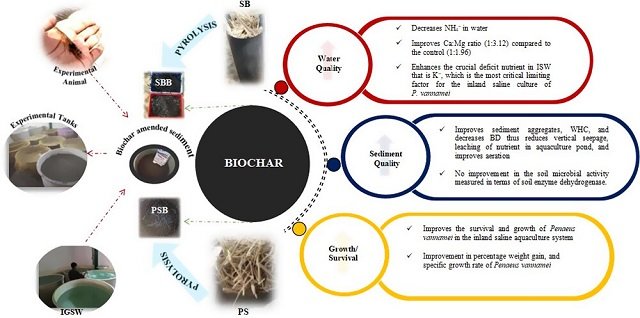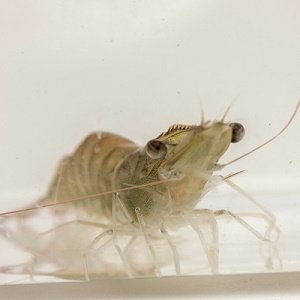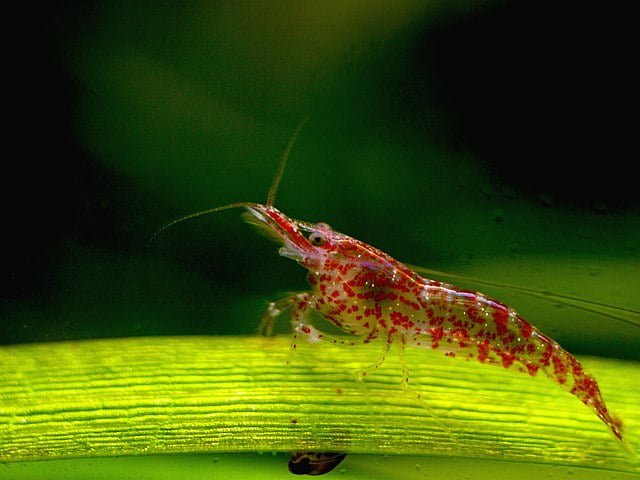
Aquaculture in saline lands has become a significant alternative for utilizing soils unsuitable for agricultural activities. By using biochar derived from agricultural waste as sediment amendments, researchers from ICAR-Central Institute of Fisheries Education and the ICAR-Central Soil Salinity Research Institute aimed to enhance water and sediment quality while promoting the growth of Penaeus vannamei in inland saline environments.
Biochar as a Sediment Amendment
The study involved the application of 100 grams of biochar, made from agricultural residues, to 25 kilograms of sediment, equivalent to 9.0 metric tons per hectare. Juveniles of Penaeus vannamei were stocked at a density of 90 per square meter in saline water with a salinity of 10 parts per thousand (ppt), supplemented with potassium levels equivalent to 50% of seawater.
Four different treatments were implemented:
T1: Rice straw biochar (PSB) applied to the sediment.
T2: Sediment modified with KOH-activated PSB.
T3: Sugarcane bagasse biochar (SBB) applied to sediment.
T4: Sediment modified with KOH-activated SBB.
Improved Water Quality
The results were impressive: biochar amendments significantly influenced water quality parameters. In particular, levels of potassium (K+), alkalinity, total hardness, calcium/magnesium ratio, and pH showed substantial improvements compared to the control group. Treatment T3, which involved the application of SBB in sediment, exhibited the best calcium/magnesium ratio (1.00:3.12). Notably, the concentration of K+ in the water increased in the order T2 > T4 > T1 > T3 > control.
Furthermore, the concentration of NH4+–N in the water experienced a significant decrease in all treatment groups, while it increased in the control group. This highlights the potential of biochar amendments to mitigate water pollution and enhance aquatic ecosystems.
Enhanced Sediment Quality
Biochar amendments also had a positive impact on sediment properties. Bulk density decreased, and the cation exchange capacity of sediments and water holding capacity increased significantly in treatments using biochar as an amendment. These changes can foster a healthier and more stable environment for aquaculture.
Microbial Activity and Aquaculture Performance
The study also assessed the impact of biochar on soil microbial parameters, specifically through soil dehydrogenase enzyme measurements. Significant differences were observed among treatment groups, indicating that biochar had a substantial influence on the soil microbiome.
Shrimp Growth
In terms of aquaculture performance, weight gain, specific growth rate (SGR), survival rate, and feed conversion ratio of P. vannamei showed significant variations between different treatments compared to the control group.
Stay Always Informed
Join our communities to instantly receive the most important news, reports, and analysis from the aquaculture industry.
“When compared to the control, shrimp raised in a cultivation system with various biochar amendments to the sediment demonstrated the best growth performance in terms of SGR and weight gain,” report the researchers. In particular, T2 exhibited the highest SGR (2.38% per day) and weight gain, while T3 showed the highest survival rate (96.1%). These findings underscore the potential of biochar amendments to boost aquaculture productivity.
Conclusion
In summary, this 45-day study provides compelling evidence that sediment amendments based on biochar are highly promising for transforming saline-affected land and saline water resources into productive and sustainable aquaculture systems.
“Biochar replaces the role of mineral mixtures and improves the environmental condition of shrimp cultivation systems when applied as a sediment amendment,” conclude the researchers.
They also report that converting agricultural waste into biochar can be a sustainable option for crop waste management, and this biochar can be used to enhance the bottoms of shrimp ponds.
By improving water and sediment quality, enhancing microbial activity, and positively impacting aquaculture performance, biochar amendments represent a viable approach to meeting the growing global demand for sustainable seafood production while protecting the environment.
These findings highlight the importance of ongoing research in this field and the potential for a brighter and more sustainable future for aquaculture.
Contact
Vidya S. Bharti
ICAR-Central Institute of Fisheries Education
Mumbai 400061, India;
Email: vsbharti@cife.edu.in
Referencia (acceso abierto)
Chalungal T. Amal, Vidya S. Bharti, Madhu Choudhary, Tao Kara, Saurav Kumar, and Ajay A. Rao. 2023. Biochar for Improving Growth Performance of Shrimp and Environmental Quality in an Inland Saline Culture System. ACS Omega Article ASAP DOI: 10.1021/acsomega.3c03484
Editor at the digital magazine AquaHoy. He holds a degree in Aquaculture Biology from the National University of Santa (UNS) and a Master’s degree in Science and Innovation Management from the Polytechnic University of Valencia, with postgraduate diplomas in Business Innovation and Innovation Management. He possesses extensive experience in the aquaculture and fisheries sector, having led the Fisheries Innovation Unit of the National Program for Innovation in Fisheries and Aquaculture (PNIPA). He has served as a senior consultant in technology watch, an innovation project formulator and advisor, and a lecturer at UNS. He is a member of the Peruvian College of Biologists and was recognized by the World Aquaculture Society (WAS) in 2016 for his contribution to aquaculture.







